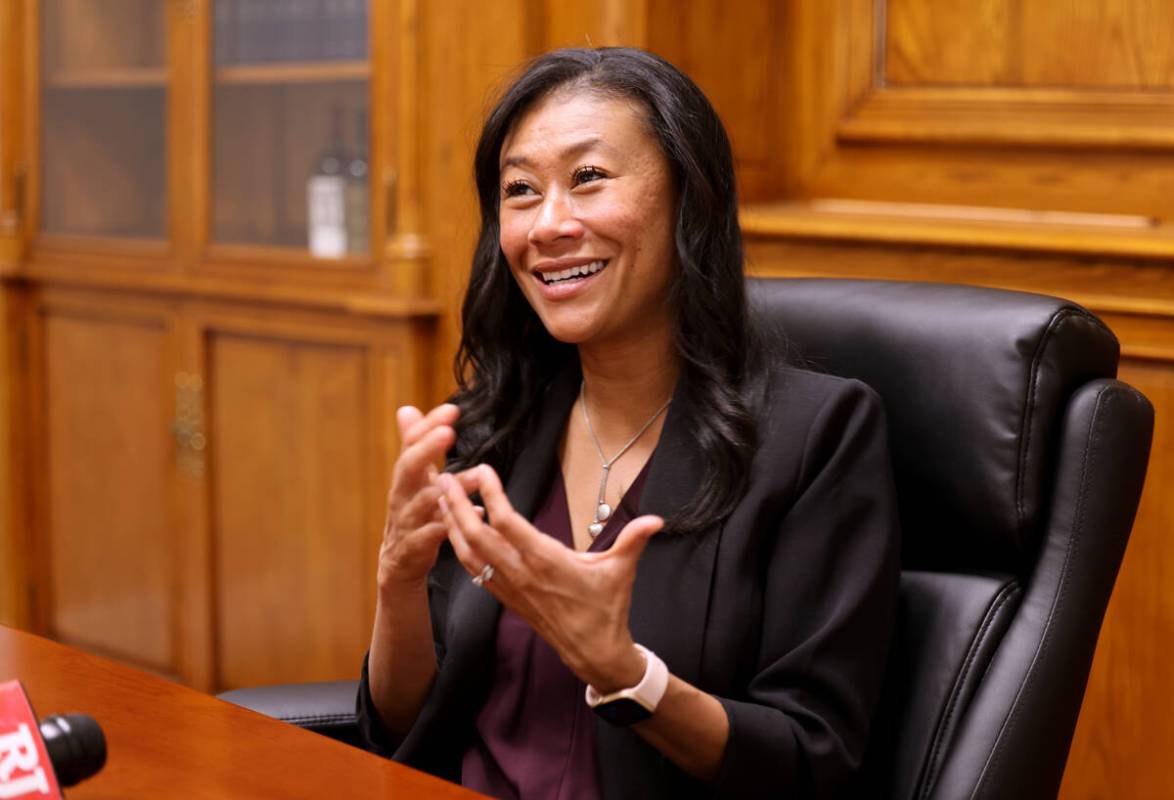First Black woman on Nevada’s high court: Appointment ‘bigger than just me’

Patricia Lee wasn’t sure if law school was something she would be able to do. Until Rosa Parks told her to go for it.
“That was all it took, because when Rosa Parks tells you to go to law school, you go to law school,” said Lee, who was appointed in November to serve as the first Black woman and Asian American on Nevada’s Supreme Court, more than 20 years after she earned the law degree the civil rights icon pushed her to pursue.
For two decades, Lee has worked as a civil litigation attorney in Las Vegas while also taking on numerous pro bono cases with the Legal Aid Center of Southern Nevada. After growing up in poverty and experiencing homelessness, to becoming the first Black woman partner at her firm and breaking barriers on the state’s highest court, Lee said she embraces being a role model for others in the legal community.
“I am going to work super hard to make sure that I leave the door wide open for the next person who wants to come in who may look like me, who may have a similar background as me,” Lee told the Review-Journal. “I know that this appointment was much bigger than just me.”
Former Nevada Supreme Court Chief Justice Michael Douglas, who was the first Black justice on the court, said Lee’s appointment will set an example for children in minority communities who can now envision themselves in her shoes.
Douglas was appointed to the court in 2004, and went on to win three elections to retain his seat. He said that Lee’s appointment shows that Douglas serving on the court “was not just a one-off.”
“The door has opened,” he said. “It’s been opened with her appointment.”
After graduating from the University of Southern California in 1997, Lee was working at the California Science Center on a project to establish a community center to provide computer access to inner-city children. The community center was named after Rosa Parks, who worked with the science center and met Lee while the recent graduate was debating going to law school.
Lee said Parks changed the trajectory of her life by taking an interest in her and encouraging her to pursue a law degree. She attended George Washington University Law School and graduated in 2002 before being recruited to join the Hutchison & Steffen Law Firm in Las Vegas.
She thought she would work in Las Vegas for a few years and then return to her family in California. Instead, Lee met her husband, started a family and has worked at the same firm since law school.
Lee made a point in her career to take on multiple pro bono cases through the Legal Aid Center of Southern Nevada, a nonprofit that provides legal services for people in civil cases. When she submitted her application to the Nevada Commission on Judicial Selection, which recommends judicial candidates to the governor, Lee highlighted her pro bono work as the most important cases of her career.
Barbara Buckley, the executive director of the Legal Aid Center of Southern Nevada, said although the organization has staff attorneys, they need to partner with private attorneys like Lee in order to meet the need for legal services. While not many private attorneys will volunteer for pro bono cases, Buckley said Lee has been one of the most involved lawyers with the organization.
After working with Lee for nearly 15 years, Buckley said she’s not surprised that Lee has made it to the state’s highest court. Buckley, who became the first female Speaker of the Assembly in the Nevada Legislature in 2007, said Lee’s appointment is breaking another barrier.
“I long for the day when we have no more firsts,” she said. “When we’re not even commenting on gender, race, ethnicity, because it is so commonplace for leaders to represent the community they serve. But we’re still not there.”
Lee was born in Jeonju, South Korea, to a Korean mother and father in the U.S. Air Force. The family moved to Lomec, California, when Lee was a young girl, but her father abandoned the family a few years later while struggling with substance abuse.
When she was as young as eight years old, Lee was left with the responsibility of shifting through government forms that her mother struggled to understand, in order to apply for food stamps and governmental assistance for the family.
Her family was homeless for stretches of time. At 15, Lee left her mother’s house because of an abusive stepfather, and she couch surfed and lived with friends until she could graduate high school.
“I vowed at a young age that my future family, whatever that may look like, would have stability. It would not include awakening to cockroaches crawling across our beds and eviction notices on the door,” Lee wrote in her application to the Nevada Commission on Judicial Selection.
Lee said that her application to the commission was the first time she had publicly addressed her childhood. Although writing her application left her vulnerable, Lee said she wants to inspire others to persevere in the face of atrocious circumstances.
“I know that there are so many young kids and young adults who have similar struggles and who have gone through similar things, and I just want to let them know if you let your circumstances defeat you, then you’ve lost,” she said. “You should succeed despite your circumstances.”
A previous version of this story misstated the name of the Legal Aid Center of Southern Nevada.
Contact Katelyn Newberg at knewberg@reviewjournal.com or 702-383-0240. Follow @k_newberg on Twitter.